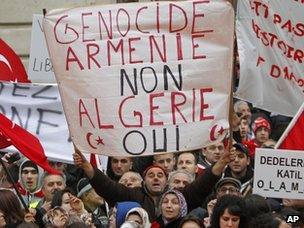'Genocide' debate sparks French,Turkish press reaction
- Published

Turkey has warned France of "serious repercussions" if the bill becomes law
The French bill to make it a criminal offence to deny that the mass killings of Armenians during WWI amounted to genocide has provoked heated reaction in the French and Turkish press.
Many French commentators see the bill as an attempt by President Nicolas Sarkozy to win the support of ethnic Armenians in next year's presidential elections.
At least one Turkish paper suggests that the bill is yet another attempt to hamper Turkey's EU ambitions, while several commentators warn of serious consequences for Turkish-French relations.
FRENCH PRESS
COMMENTARY BY PATRICK ROGER IN LE MONDE
As election day approaches, the Armenian question is again the subject of public debate. In response to the prompting of France's Armenian community, the head of state has given the green light to the reopening of legislative debate on history and memory. The approach of the presidential election has led Mr Sarkozy to take care not to allow any advantage to the Socialist candidate in the eyes of voters of Armenian origin.
SOPHIE HUET IN LE FIGARO
Ankara is up in arms. But Nicolas Sarkozy does not regret the promise he made in Yerevan, the capital of Armenia. The head of state does not want to throw oil on the fire, and so he turns to "the wisdom of the Assemblies".
COMMENTARY BY GREGOIRE BISEAU AND JULIETTE RABAT IN LIBERATION
This project, which is as much symbolic as it is a piece of electioneering, was decided by Sarkozy in 2007, then forgotten about in order to please Ankara, before being revived by the [France's ruling] UMP with the prospect of the 2012 election coming up.
EDITORIAL BY FRANCOIS SERGENT IN LIBERATION
The position of the Turkish state is indefensible. Genocide, according to the definition coined by the Polish lawyer Raphael Lemkin, belongs to a precise and restricted category of law based on the deliberate nature of the crimes and the determination to exterminate an ethnic group. These conditions apply to the Armenian genocide as much as they do to the genocide of the Jews and the Tutsis, the only two to have been "recognised" and judged by the international community. By denying the 1915 exterminations as it has done for nearly a century now, Turkey is rewriting its own history and lying about its past.
TURKISH PRESS
COMMENTARY BY MEHMET ALI BIRAND IN POSTA
Politics is like that. In order to be elected, politicians can find everything appropriate.
COMMENTARY BY NAGEHAN ALC IN AKSAM
Today, France will hold one of the most insane votes in its history and Sarkozy, who first rejected the draft but then suddenly accepted it just on account of his election plans and the antagonism he feels towards Turkey, will finish the process of turning a very important historical issue into a means to achieve his own end.
COMMENTARY BY MEHMET TEZKAN IN MILLIYET
Sarkozy has two reasons to want this law to be passed: One of them is an election investment aimed at Armenian votes. The second one is to damage relations with Ankara. The relationship between Sarkozy and Erdogan has not been good at all. From today onwards, bridges will be burnt. Sarkozy's plan is to alienate Turkey from the EU with such manoeuvres.
COMMENTARY BY RAUF TAMER IN POSTA
It doesn't matter whether or not parliament passes the bill. The attempt to pass it is already enough to damage relations.
COMMENTARY BY ALI BAYRAMOGLU IN YENI SAFAK
According to the interpretation of the 301st Article of the Turkish Penal Code, it is a crime to say "there was an Armenian genocide". In France, it is a crime to say "the Armenian Genocide did not take place". Is it possible not to realise that both attitudes restrict freedom of thought… and prevent both sides from questioning themselves? The damage the French law will cause will be great.
ARMENIAN PRESS
HEADLINE IN GOLOS ARMENII
Ankara is furious. How will Paris respond?
BBC Monitoring, externalselects and translates news from radio, television, press, news agencies and the internet from 150 countries in more than 70 languages. It is based in Caversham, UK, and has several bureaux abroad.
- Published16 June 2011